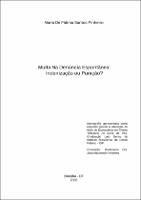Use este identificador para citar ou linkar para este item:
https://repositorio.idp.edu.br//handle/123456789/4387| Título: | Multa na denúncia espontânea: indenização ou punição? |
| Autor(es): | Pinheiro, Maria De Fátima Santos |
| Orientador(es): | Ximenes, Julia Maurmann |
| Palavras-chave: | Multa de mora;Infrações tributárias;Código Tributário Nacional;Denúncia |
| Data de submissão: | 2023 |
| Editor: | Instituto Brasiliense de Direito Público |
| Citação: | PINHEIRO, Maria De Fátima Santos. Multa na denúncia espontânea: indenização ou punição?. 2023. 66 f. Monografia (Especialização em Direito Tributário) - Instituto Brasiliense de Direito Público, Brasília, 2008. |
| Resumo: | O presente trabalho visa analisar se a multa de mora cobrada na denúncia
espontânea tem natureza indenizatória ou é de natureza punitiva. Para melhor
desenvolver o estudo foi feita análise do Instituto da Denúncia Espontânea, os
pressupostos que devem ser cumpridos pelo sujeito passivo, na forma do art. 138 do
Código Tributário Nacional. Posteriormente foram abordadas as questões das
infrações tributárias na área penal, regida pelo Direito penal e infrações tributárias
administrativas regidas pela legislação tributária de cada ente tributante, fazendo a
distinção entre o contribuinte inadimplente, que comete infração por negligência, do
contribuinte sonegador, que infringe a legislação tributária por dolo, tem a intenção
de ludibriar a Fazenda Pública. Em seguida estudamos os juros de mora cujo índice
utilizado é o índice da taxa SELIC e tem o objetivo de indenizar a Fazenda Pública
pelo pagamento do tributo em atraso. Por fim estudamos a multa de mora e a multa
de ofício observando a diferença entre elas e o seu caráter punitivo. O estudo foi
desenvolvido mediante pesquisa de textos legislativos, bibliográficos analisando
conceitos e entendimentos doutrinários bem como a jurisprudência do Superior
Tribunal de Justiça, do Supremo Tribunal Federal e Decisões Administrativas dos
Conselhos de Contribuintes da Secretaria da Receita Federal do Brasil. |
| Abstract: | The present work aims at to analyze if the fine of deferred payment charged in the spontaneous denunciation has indenizatória nature or is of punitive nature. Better to develop the study analysis of the Institute of the Spontaneous Denunciation, the estimated ones that they must be fulfilled by the passive citizen, in the form of art was made. 138 of the Internal revenue code . Later had been boarded questions of infractions taxes in area criminal, prevailed for Criminal law and infractions taxes administrative prevailed for legislation tax of each being tributante, making distinction between contributing defaulter, that it commits infraction for recklessness, of the contributing tax evader, who infringes the legislation tax for deceit, has the intention of ludibriar the Public Farm. After that we study the deferred payment interests whose used index is the index of tax SELIC and has the objective to behind schedule indemnify the Public Farm for the payment of the tribute. Finally we study the fine of deferred payment and the fine ex-officio observing the difference between them and its punitive character. The study it was developed by means of research of legislative, bibliographical texts analyzing doctrinal concepts and agreements as well as the jurisprudence of the Superior Court of Justice, of the Supreme Federal Court and Administrative resolutions of the Advice of Contributors of the Secretariat of the Federal Prescription of Brazil. |
| URI: | https://repositorio.idp.edu.br//handle/123456789/4387 |
| Aparece nas coleções: | Outras Especializações |
Arquivos associados a este item:
| Arquivo | Descrição | Tamanho | Formato | |
|---|---|---|---|---|
| Monografia_Maria De Fátima Santos Pinheiro_Especialização_2008.pdf | 438.52 kB | Adobe PDF |  Visualizar/Abrir |
Os itens no repositório estão protegidos por copyright, com todos os direitos reservados, salvo quando é indicado o contrário.
